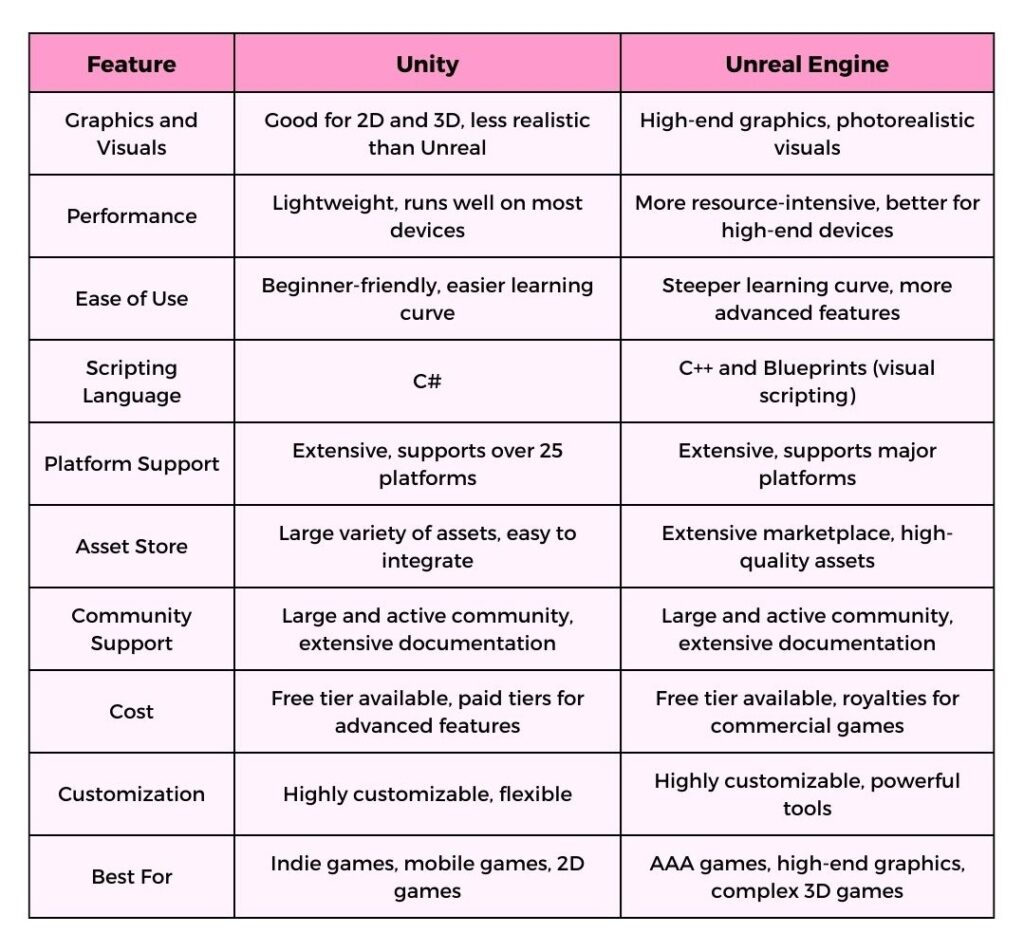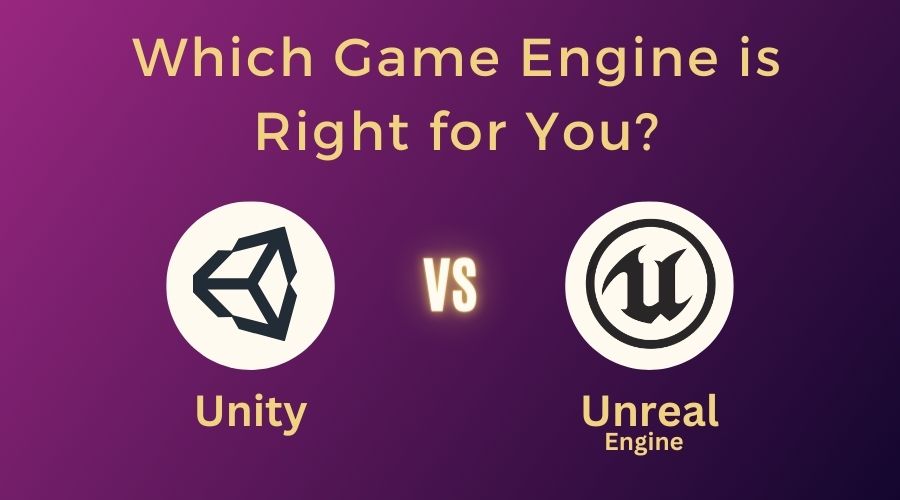Choosing the correct game engine is a critical step for any aspiring game creator. With so many alternatives, it might be difficult to decide which one is ideal for your needs. Unity and Unreal Engine are two of the most popular game development engines. Both provide powerful features and capabilities, but each has its own set of advantages and disadvantages. In this post, we’ll look at the differences between Unity and Unreal Engine so you can make a good choice.
Unity is well-known for its user-friendly design and accessibility, making it an ideal choice for beginners and indie developers. It provides a diverse variety of tools and content, as well as a huge and active community of support and cooperation. Unreal Engine, on the other hand, is well-known for its amazing graphics and powerful performance, making it ideal for developing high-end, AAA-quality games. However, its complex features may need a longer learning curve for beginners.
Understanding the benefits and weaknesses of Unity vs Unreal Engine can assist you in selecting the best tool for your project, whether you’re creating a simple mobile game or a complicated, realistic masterwork. So let’s get started and figure out which game engine is best for you.
Table of Contents
What is a game engine?
A game engine functions as the heart and brain of a video game. It is a software framework that offers developers with the resources and skills they require to produce and create video games. This includes things like graphics rendering, physics handling, audio management, and so on. Developers save time and effort by using game engines rather than starting from scratch.
Key features of game engines:
Game engines include a variety of features which helps game development:
- Graphics Rendering: Game engines produce or generate the images you see in games. They can do everything from make 2D sprites to produce complicated 3D sceneries with realistic lighting effects.
- Physics Simulation: Game engines model how objects move and interact in a virtual environment. Gravity, collisions, and object behaviour are some examples of this.
- Audio Management: They are in control of the sounds and music in games, including background music, footfall, and explosions.
- Scripting and programming: Game engines frequently feature a scripting language or support for programming languages, enabling developers to design game logic and behaviour.
- Cross-Platform Support: Many game engines support numerous platforms, including PCs, consoles, and mobile devices, making it easier to create games for various systems.
- Asset Management: They assist organize and manage game assets such as models, textures, and animations.
- Editor Tools: Game engines include tools for developing levels, adding objects, and testing gameplay without writing code.
What is Unity?
Unity is a professional and versatile game engine that is commonly used to create 2D and 3D games, simulations, and other interactive content. Unity Technologies released it in 2005, and it has since become one of the most popular choices among game developers around the world.
Key Features:
Unity provides a variety of capabilities that make game production more accessible and efficient.
Unity’s versatility is a remarkable feature. It works with a variety of platforms, including PCs, consoles, mobile devices, and even virtual reality (VR) and augmented reality (AR). Developers can release their games to a wider audience because to this flexibility.
Unity also has a large asset store where developers may find ready-made objects, scripts, and tools to improve their games. This allows you to quickly prototype ideas and iterate on them until they are refined and ready for release.
Furthermore, Unity’s visual scripting tool, called Unity Visual Scripting (previously known as Bolt), enables non-programmers to design complex behaviors and interactions without writing a single line of code.
Popular Games Made with Unity:
Unity has been used to develop a wide range of games across multiple genres. Some of the most popular games created with Unity include:
- Pokémon GO
- Hollow Knight
- Cuphead
- Ori and the Blind Forest
- Among Us
- Monument Valley
What is Unreal Engine?
Epic Games developed Unreal Engine, a powerful game engine. It was originally used in 1998, with the launch of the game “Unreal.” Unreal Engine was originally created for first-person shooters, but it has since evolved into a versatile tool for a variety of games and other real-time applications. Its ongoing development and improvements have maintained it at the forefront of gaming technology.
Key Features:
Unreal Engine provides a punch with unique features that make game development an exciting endeavor. To begin, its outstanding graphical capabilities are stunning, bringing worlds to life with realistic lighting, shadows, and complex surroundings. But it’s not just about appearance; Unreal Engine’s Blueprint Visual Scripting provides a creative playground for developers to develop gameplay mechanisms without getting stuck down in code. The engine’s cross-platform compatibility assures that your work may be enjoyed by players on PCs, consoles, mobile devices, and even VR/AR installations, allowing you to easily expand your audience.
Real-time editing also allows you to change and experiment on the fly, making the development process more efficient and entertaining. And don’t forget about its powerful physics engine, which handles anything from basic collisions to complicated simulations with ease, providing reality and depth to your designs. With these and other capabilities, Unreal Engine allows developers to express their creativity and create amazing gaming experiences.
Popular Games Made with Unreal Engine:
Many successful and popular games have been made utilizing the Unreal Engine, showing its variety and strength:
- Fortnite
- Gears of War Series
- Gears of War Series
- Street Fighter V
- Final Fantasy VII Remake
Head-to-Head Comparison: Unity vs Unreal

Similarities Between Unity and Unreal
Unity and Unreal Engine, two of the most popular game production systems, share some significant characteristics, making them both great choices for building games.
1. Cross-Platform Capabilities
Both Unity and Unreal Engine enable developers to create games that can be played on a variety of platforms, including PC, consoles (such as PlayStation and Xbox), mobile devices (iOS and Android), and even VR/AR systems. This means you can create your game once and then publish it across several platforms, reaching a larger audience.
2. Strong Community and Support
Both engines have robust, active developer communities. These communities provide large forums, tutorials, and resources. Whether you’re a beginner looking for assistance or an experienced developer looking for advanced techniques, there’s plenty of Unity and Unreal support and knowledge sharing available.
3. Asset Stores
Unity has the Unity Asset Store, while Unreal Engine has the Unreal Marketplace. These are online marketplaces where developers can purchase and sell assets like as 3D models, animations, sound effects, and scripts. These assets can considerably speed up production by supplying pre-made components for use in your game.
4. Powerful Graphics and Visuals
Both engines can create amazing images and high-quality images. They provide powerful rendering techniques, lighting systems, and post-processing effects for visually stunning games. As a result, they are useful for building both realistic and stylized games.
5. Robust Toolsets
Both Unity and Unreal Engine provide full game development tools. This comprises tools for level design, animation, physics, and debugging. These built-in capabilities simplify the creation process, making it easier to develop complex and refined games.
6. Flexibility and Customization
Both engines offer a great level of flexibility and customization. You can customize the engine to meet your project requirements, build custom tools, and connect third-party plugins. This enables developers to customize the development environment to their specific workflow and project requirements.
Differences Between Unity and Unreal
1. Learning Curve
- Unity: Easier for beginners because to the simplified UI and scripting (C#).
- Unreal Engine: More complicated tools and scripting (Blueprints and C++) make for a steeper learning curve.
2. Graphics and Visuals
- Unity: Good quality, but may take more effort for high-end visuals.
- Unreal Engine: Known for producing high-quality graphics and photorealistic rendering out of the box.
3. Scripting Languages
- Unity: uses C# for scripting, which is easy for beginners to master.
- Unreal Engine: Provides both Blueprints (visual scripting) and C++, giving more versatility but requiring a longer learning curve.
4. Customization and Flexibility
- Unity: flexible, but sophisticated modification may require more effort.
- Unreal Engine: highly customizable, with several tools and possibilities for skilled users and large teams.
5. Platforms and Deployment
- Unity: Supports multiple platforms, including mobile, console, and PC.
- Unreal Engine: It supports a variety of platforms but is best known for high-end PC and console development.
6. Asset Store and Marketplace
- Unity: A large asset marketplace with a wide selection of assets, plugins, and tools.
- Unreal Engine: Marketplace offering high-quality assets and plugins, but less alternatives than Unity.
7. Community and Support
- Unity: A larger community with several tutorials and resources available online.
- Unreal Engine: An active community with official Epic Games support, though slightly smaller than Unity’s.
8. Cost and Licensing
- Unity: free for personal and small business use, with premium memberships available for bigger teams and commercial use.
- Unreal Engine: Free to use, with a royalty fee based on gross sales above a particular threshold; better suited to larger projects.
9. Target Audience
- Unity: indie developers, small to medium-sized studios, and mobile game creators.
- Unreal Engine: Larger studios, AAA game creators, and those who require high-quality graphics and performance.
Wrapping Up – Unity vs Unreal?
Choosing between Unity and Unreal Engine is mostly determined by your personal requirements and the type of game you want to develop.
Unity is ideal for beginners and small teams. It’s easier to learn and includes a variety of resources and lessons. Furthermore, its asset shop is stocked with ready-made assets to speed up creation.
In contrast, Unreal Engine excels in high-end graphics and performance. It is preferred by larger companies for high-budget projects due to its advanced capabilities and amazing visual effects.
Both engines offer advantages and disadvantages, and the best option ultimately depends on your project’s specific needs and your personal programming language knowledge. Regardless of which engine you select, Unity and Unreal Engine both provide full resources and friendly communities to help you bring your game development ideas to life.
